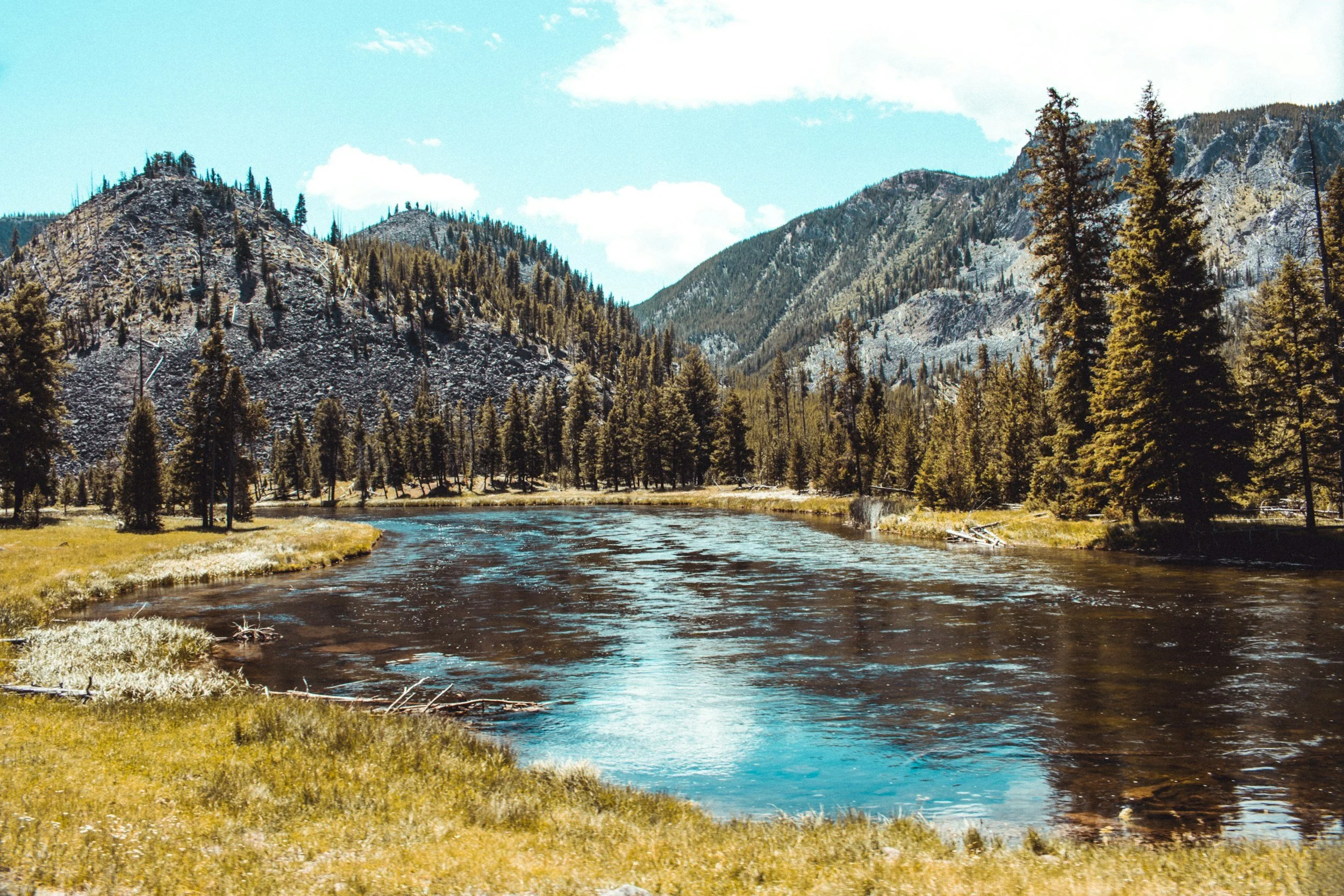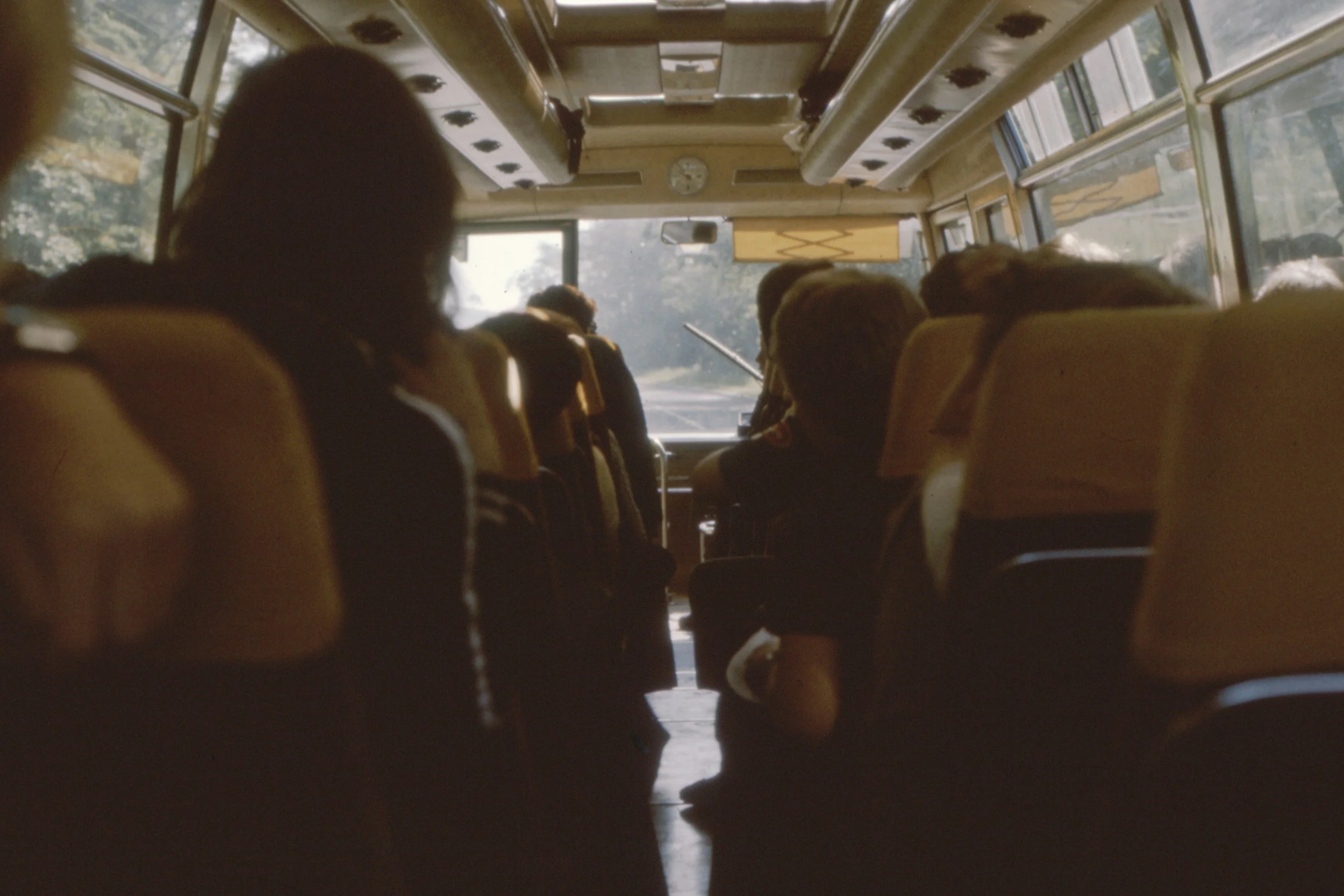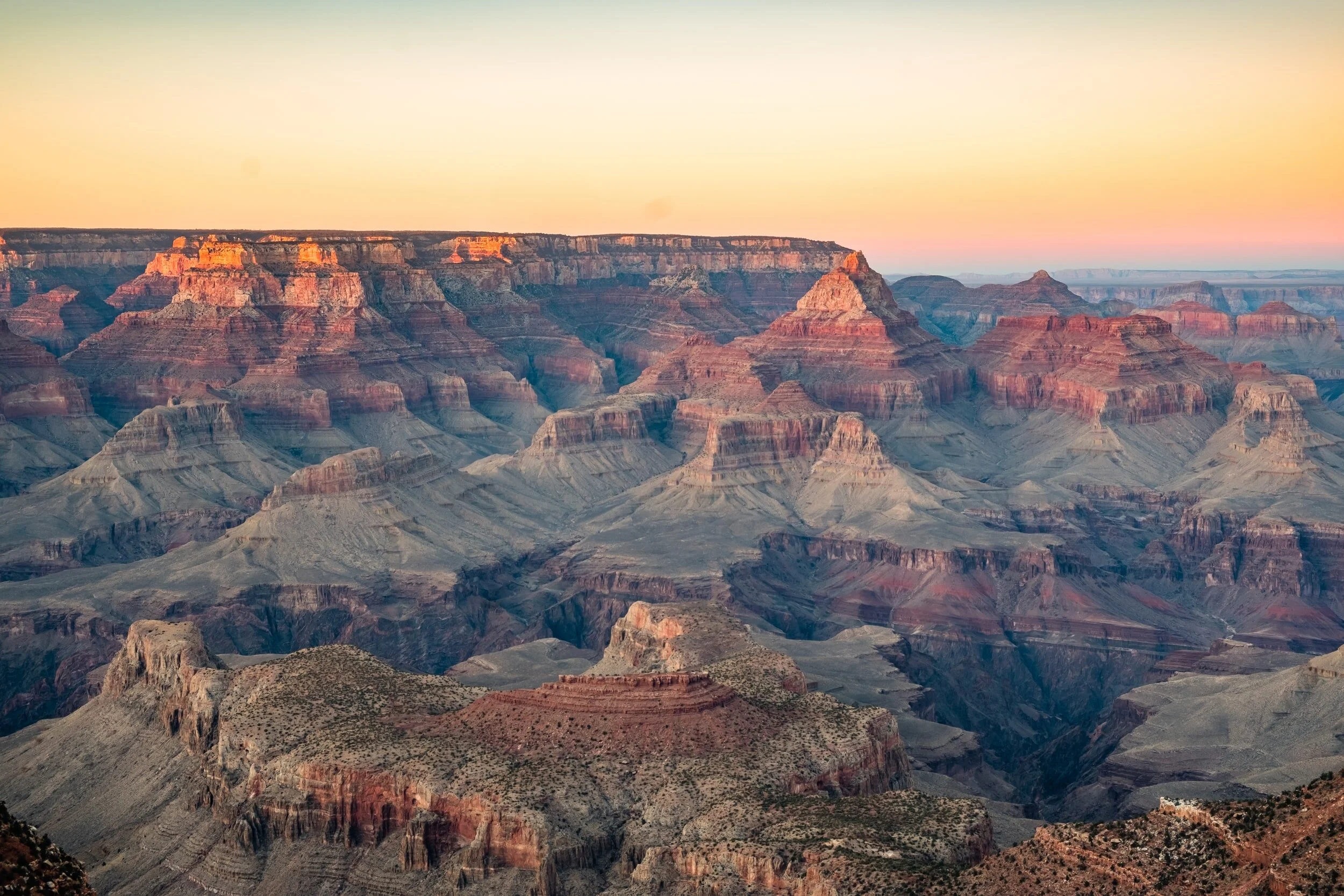Railcars
When I was a child, each summer, my mother took my sisters and me on a journey westward from our home in New Jersey to Minnesota, where my grandparents, cousins, aunts, and uncles lived. Although my sisters and I delighted in the prospects of seeing our relatives once again, what pleased us most was the train ride that lay ahead. Our trip lasted two days, taking us from our own familiar cityscape to the rolling hills of Pennsylvania and Ohio, through the flat country of Indiana, to glittering Chicago where we disembarked and changed trains, onward through Wisconsin’s dells and dairy farms, to Minnesota’s woods and lakes, finally arriving at our journey’s end, exhausted, exhilarated, unspeakably content, in the warmth and comfort of my grandmother’s kitchen.
We loved traveling by train because unlike cars and buses, we did not have to follow roads and highways but could pass through varying terrain, blending in with, looking out upon, the secrets and essence of urban and rural life. We journeyed in the richest sense, for we felt connected to the people in the communities we passed through. Wheat fields, lakes, pine forests, tiny towns with white wooden churches, soot-stained alleyways of grimy industrial centers: these images would flash into view, disappear suddenly, and remain fixed forever in my imagination.
On board the train, too, we felt a daring sense of adventure. We encountered a wide world and its people, discovering, in our fellow passengers, customs and cultures different from our own, discovering also those shared human experiences that bring us together, partners, in a richer, grander, more mysterious journey, larger than us all. This sense, of being one thread in an intricate web of human existence, was liberating—and comforting. It sparked in me the growth of an imaginative inner life and a desire to forge connections between people and across chasms of centuries and miles.
For my sisters and me, these trips out west became the highlights of our summers. The night before leaving, we did not sleep but crawled into one bed, projecting in secret whispers what excitement our train ride would bring: who we would meet, what we would see, the remembered sounds, tastes, smells, the rhythmic rush and peace and amity that was to us the railroad.
Early morning had us at Newark’s Penn station, running to keep up with our mother’s long strides as she juggled half a dozen odd and heavy bundles. We passed along the platform where the rusty grunts, hisses, and grinding of pistons would sound like majestic music. Expectantly, we passed car after car of silver and blue, the conductors waving us on ahead, calling out: “All aboard. Train leaving for Chicago and all points west. Watch your step ma’am. All aboard.” We hoisted our bags and bodies up narrow iron stairs, tumbling into the passenger corridor, feeling the jolt as the train pulled out with three heaving sighs.
Once seated, we scrutinized the train conductors. Their blue suits and caps were not starchily stiff but seemed as natural them as kernels to a cob, trimmed with golden braid. They punched our tickets a satisfying click, click, click, never smiling, staring gruffly at us with full-faced glowers, until just before turning away, they’d wink one long secret wink, and with that motion seal with us a pact of adventuresome friendship.
As my mother disentangled our heap of belongings, my sisters and I would steal off, proudly bobbing the aisles. In tune with the rolling skip and break of the wheels beneath us, we navigated detective-like the length of the train. Each car had families like ours, with scattered bags of food and clothing, driveling babies, disheveled moms and dads. A grandmotherly woman might offer us cookies, which we would accept bashfully. We scouted out the families traveling with pets—dogs, cats, even rabbits in crates at their feet; once, a parrot rested in a basket on a young man’s lap. We poked our fingers into the animals’ crates, offering them crumbs of cookies.
Each coach was slightly different; some had vinyl seats separated by arm rests, perfect for reading newspapers and for maintaining between strangers equitable, decorous divisions of space. Others had plush seats without arm rests, permitting newlyweds to cuddle intimately in private connubial nests, allowing sleepy, overfed passengers to stretch out lengthwise, feet jutting precariously into the aisles, and young toddlers to snuggle like kittens, heads resting on each other’s laps. When four seats faced each other, passengers might swap war stories, engage in fierce political debates, or alternately, discuss family matters, exchange recipes, and share photographs of sweethearts and grandchildren.
Arriving at the snack bar, we surveyed, wistfully, the purchase of potato chips, soft drinks, chocolate bars, and sandwiches, the lucky passengers carting away their goodies in brown cardboard containers. The lines were long, and the cashier looked harried, but I envied her job. She got to wear a blue striped shirt and red bowtie. She knew all about the towns we passed through, and despite the train’s sudden jolts, never spilled the coffee she poured into small cardboard cups. To spend one’s life working on a train! That to me seemed supreme. I imagined myself serving coffee to thousands of smiling customers, greeting people in towns across the nation. Once, I bought with long-saved allowance a pack of playing cards embossed with the Amtrak logo. I kept it hidden in my underwear drawer, a token of my resolve to one day take a job on the railroad, to set out confidently and discover the world.
Wandering further, we came to the smoking lounge, which held an aura of mystery. There we became clandestine observers in the blue-hazed confines of adult chat and laughter. Smoke drifted from dim-lit corners. We heard the clink of glasses, the shuffle of cards, the echo of voices, mix with the rumbling of the train. Shadowy figures sat in stupors over chess games. Men and women bought secrets with a drink. It seemed a burly man always sat at a piano. His bouncy tunes softened out after nightfall to sleepy melodies about early death and lost love.
We investigated all the cars, pausing to test water fountains, to peek into restrooms, and to size up other children our age. Eventually, we reached the front of the train, marked by a roped off doorway. Just beyond was the engine—a powerful, monstrous machine. Dark and thunderous, it emitted deep roars, angry rumbles, shrill blasts and screams, imparting an unsettling sense of reverence and doom. We stood quaking before it, feeling its terrible vibrations in our teeth and bones. I’m not sure why I found the engine so compelling. Looking back, I might call its lure foreboding. Did it represent a fearful unknown? Reveal a darker side of human existence I had not yet encountered? Whatever it signified, our interaction was limited. Almost immediately a conductor would call us back, and we’d reluctantly turn around and retrace our steps.
Returning to our seats, we found our mother more refreshed, having unpacked, now engrossed in a book or in friendly conversation with fellow passengers. Intriguing people travelled by rail: musicians, nurses, old ladies going to funerals, construction workers, teachers, soldiers on leave. We met immigrant families, visitors from India, Yugoslavia, Japan. I gazed at our new acquaintances, listening, entranced, to their strange and wonderful stories. Imagining myself in far-off lands, I wondered what it would be like to live in a different place and time, to speak a different language, to have a different color of skin.
For dinner, my mom served graham crackers, apples, and Swiss cheese on rye. Eating with gusto, we chattered excitedly as the train rushed on. Afterwards, we dug out coloring books, games, and beloved stuffed animals. My older sister travelled with a chimpanzee nearly half her size. He received lots of attention from our fellow passengers, including gifts of popcorn and nuts. I kept a small purple squirrel tucked under my arm, and my younger sister, a lumpy, shapeless bear. Sometimes other passengers would join in our fun. A kind middle-aged waitress let me win at checkers. A balding artist showed us how to fold napkins into flowers and swans. Once, a whole section of our car joined in on a rousing game of “Twenty Questions.”
Come nightfall, we washed up in the communal ladies’ bathroom. These were crowded with crying babies, mothers prodding sleepy toddlers into night clothes, elderly women, who to our delight would let us examine their dentures after they cleansed them. We sampled toothpaste flavors from other girls our age. This was invigorating, like a slumber party. We shared, in the proximity of people from many cultures, regions, and backgrounds, the nighttime rituals common to us all.
Spreading out on blankets and the sweet papery railroad pillows, we lay quietly, head-to-toe on the seats and on the floor, listening to the rumbling of the train. Surrounding voices dropped to whispers, occasionally a cough or whimper as sleep came to us all. After midnight, I’d awaken to find the train in a hush of darkness, save for a low droning snore and the clatter of wheels below. Leaning against the darkened pane, I could see my reflection against the blue-black shades of night. My reflected image seemed strangely unreal, separate from and smaller than the person I felt myself to be. I envisioned myself as part of the countryside we passed through. The moon illuminating fields, ponds, and farmhouses, I would think of the early settlers long ago, the days of Laura Ingalls when our country was young, and I believed I could hear the cry of wolves. Sometimes I remained that way, gazing out as dark forms flashed by and were gone, growing gray then dusty orange as the sun began to rise. When the train stopped to refuel and board more passengers, I’d hear gentle groans and stretches as people woke in the cramped positions of groggy sleep.
Mornings were wonderful, for we would breakfast in the dining car. We sat down grinning, admiring the white, stained tablecloth and the wilting rose in the center vase. We ordered from an elderly waiter who served coffee from a silver pot. Eating our fried eggs and Texas toast, we stared at the new land before us, so flat and golden-green in the morning light. At the tables around us, passengers read newspapers and discussed world affairs. I learned about the price of wheat in North Dakota, cattle-raising in Wyoming, the allure of Saint Louis nightlife. A new world opened before me, evident in the fast-appearing landscapes outside my window, and in the farthest reaches of my own imagination.
After breakfast, we arrived in Chicago. Momentary chaos ensued as everyone gathered their belongings, preparing to make the mad dash to trains departing from other platforms. We ran breathlessly behind our mother, arms and hands grasping suitcases, books and blankets, our hair wildly unkempt, shirttails dangling, shoelaces untied. We passed, once again, a long line of blue and silver cars and were waved on ahead until finally a conductor stretched out his hand and lifted us into our new abode.
Again, we explored the length of the train, noting the differences in seat formations, smiling at conductors, dancing down corridors, spying with delight (and greeting with hugs) some of our newfound friends who had made the transfer with us. After establishing ourselves in our new surroundings, we spent the rest of the day in the sunny observation car with its glass-domed ceilings and red cushioned seats. We read books, told stories, and gazed out at the panoramic view. As the hours passed, the train seemed to pick up speed. My heart beating rapidly, I pressed my feet against the floor to spur the train forward. Fields and farms rolled into lakes and woodlands. Excitement rose through the car as we crossed the Mississippi, with its crags and bluffs and islands. By late afternoon, the train pulled into the depot. Waving goodbye to our newfound friends, we tumbled off the train and into my grandfather’s arms.
An entire month of adventure now lay before us: visits to the state fair, the unrivaled taste of grandma’s rhubarb pie, afternoons playing in corn fields or resting in the shade of my grandparents’ weeping willow tree. We loved Minnesota and wished aloud that our summers there might never end. But at the back of our minds we already contemplated our return, secreting away an anticipatory glow of the excitement we’d experience on our train ride home.
As I look back on these early experiences with train travel, I do wistfully, knowing I have lost much of that wondrous childlike way of seeing the world. Life no longer seems as magical, unified, and free. Threads break, barriers arise, weariness sets in. The trains, too, have changed, with ridership dwindling and services cut. Passengers seem less eager to talk, ensconced in headphones, laptops, and tablets. Still, whenever I travel on a train, I recapture a kernel of that same adventurous spirit. I experience myself as I once was, wide-eyed, curious, eager to see the world, to share in other people’s lives. Experiencing my younger self, I uncover those same feelings of security and communal adventure, understanding, once again, what it means to journey in the richest sense—through time and place and culture.
-Monica Mische
Monica Mische is a professor of English at Montgomery College where she teaches writing and literature and coaches students with disabilities. She is also active in social justice and environmental causes. Her recent creative and academic work appears or is forthcoming in EcoTheo Review, Mount Hope; JAEPL (University of Tennessee); Pedagogy (Duke University Press); and the anthologies Deep Beauty: Experiencing Wonder When the World Is on Fire (Woodhall) and Recreating Our Common Chord (Universal Table).





















